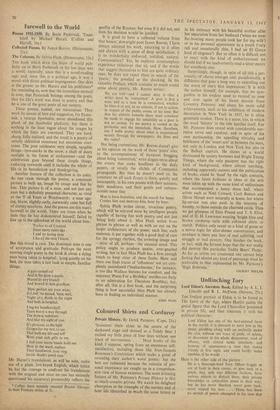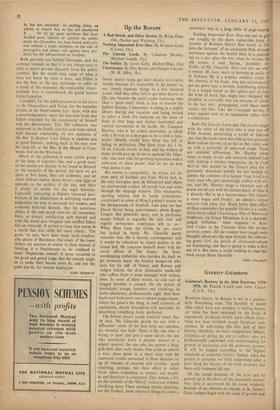Unflinching Tory
Lord Eldon's Anecdote Book. Edited by A. L. J. Lincoln and R. L. McEwen (Stevens, 25s.) Tint liveliest portrait of Eldon is to be found in The Spirit of the Age, where Hazlitt paints the
genial figure that the Lord Chancellor presented in private life, and then contrasts it with his political character: Lord Eldon has one of the best-natured faces in the world; it is pleasant to meet him in the street. plodding along with an umbrella under his arm, without one trace of pride, of spleen, or discontent in his whole demeanour, void of offence, with almost rustic simplicity and honesty of appearance--a man that makes friends at first sight, and could hardly make enemies, if he would . . .
Here is the other side of the picture :
He is a thorough-bred Tory. Others boggle or are at fault in their career,. or give back at a pinch, they split into different factions, have various objects to distract them, their private friendships or antipathies stand in their way; but he has never flinched, never gone hack, never missed his way. . . . There has been no stretch of power attempted in his time that he has not seconded: no existing abuse, so odious or absurd that he has not sanctioned it. . . . On all the great questions that have divided party opinion or agitated the public mind, the Chancellor has been found uniformly and without a single exception on the side of prerogative and power, and against every pro- posal for the advancement of freedom.
Both portraits are faithful likenesses, and the contrast reminds us that it is not always safe to infer a man's private character from his public conduct. But the world must judge of what it does not know by what it does, and Eldon is not the first, or the last, statesman to suffer as a result of this necessity; the implacable, imper- turbable Tory is remembered, the genial human • being forgotten.
Campbell, for the political portrait in his Lives of the Chancellors, and Twiss, for the homelier picture in his three-volume Life, drew, with due acknowledgements, upon the anecdote book that Eldon compiled for the amusement of himself and his descendants. This MS collection was preserved in the family and has now been edited, with discreet scholarship, by two members of the Bar. It displays Lord Eldon in undress and in good humour, looking _back at his ease over his long life at the Bar, in the House of Com- mons, and on the Woolsack. • Much of the collection is mere circuit gossip or the shop of Lincoln's Inn, and a good many of the stories are already to be found in Boswell or the memoirs of the period; but here we get them at first hand; they are authentic, and set down without malice. Some throw a new light on episodes in the politics of the day, and there is plenty of matter for the legal historian. Especially interesting is Eldon's laboured justi- fication of his dilatoriness in delivering reserved judgments; he tries to persuade his readers, and evidently believed himself, that his notorious delays in the end saved time for all concerned. Here, as always, satisfaction with himself and with the status quo wrapped and muffled Eldon like an overcoat. It served to keep him warm in a world that was chilly for some others: 'The gaols,' he says, have been made 'such comfort- able places of Residence that many of the lower Orders are anxious to winter in them instead of thinking it a Punishment to be confined in them.' Deplorable indeed! It never occurred to the good and genial judge that the remedy might be to make their homes more fit, and not the gaols less fit, for human habitation.
JOHN SPARROW



































 Previous page
Previous page